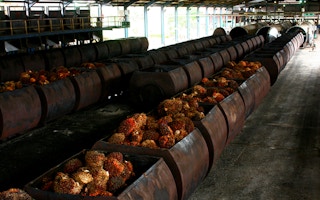State-owned electricity firm PT Perusahaan Listrik Negara (PLN) will increase the use of palm oil to feed its power plants, to reduce its dependence on fossil fuels.
On Monday, PLN signed agreements that, according to president director Nur Pamudji, will help it secure fuel feedstock for its pilot projects.
Under the agreements, Jakarta-listed PT Sinar Mas Agro Resources and Technology will supply 3,320 tonnes of processed palm oil (PPO) to PLN’s diesel-fired power plant in Titi Kuning, Medan, North Sumatra; privately owned PT Wilmar Nabati Indonesia will supply 1,250 tonnes to PLN’s Bagan Besar and Bagan Siapiapi power plants in Dumai, Riau; and private firm PT Wilmar Cahaya Indonesia will supply 2,150 tonnes to PLN’s four power plants in West Kalimantan, all this year.
PLN is expecting to sign similar deals with four more palm-oil producers. “We remain in discussions with other companies and hope to announce plans soon. We aim to use around 1 million tonnes,” Pamudji said after the signing ceremony.
He declined to name the other potential suppliers. But power plants set to receive PPO supplies would be located near oil-palm estates in Sumatra, Kalimantan and Sulawesi to minimize transportation costs.
The government has been encouraging the use of non-fossil fuels as domestic fossil-fuel production, particularly oil, has declined and can no longer meet increasing demand and oil imports have become a major issue in the country’s trade balance.
“
Pertamina is working on a tender to seek supplies of up to 6.6 million kilolitres of biodiesel to meet the government’s regulations on mandatory usage of non-fossil fuels.
Under economic packages launched last August, the government imposed a mandatory percentage of biodiesel use to help reduce fuel imports.
According to figures from the Energy and Mineral Resources Ministry’s directorate general for electricity, the country had 46,428 megawatts (MW) in installed capacity as of the end of 2013.
Forty five per cent of the total capacity came from coal-fired power plants, 20 per cent from steam- and gas-powered plants and 12 per cent from diesel-powered plants.
Pamudji said PLN had started using PPO to fuel its power plants in 2007, before suspending its use as the price of the commodity rose significantly surpassing the price of high-speed diesel fuel.
Under the agreements with Sinar Mas Agro, Wilmar Nabati and Wilmar Cahaya, the price of PPO is set at 91.37 per cent of the Mean of Platts Singapore (MOPS) — the benchmark for fuel-oil pricing.
Theodore P. “Teddy” Rachmat, whose Triputra group owns several oil-palm plantations, said the new pricing already benefited the business sector.
“Pricing used to be a reason why supplies to PLN and [state oil and gas firm] Pertamina could not be maintained in the past. We’re now […] selling it at the market price. PLN can save 15 percent [by not buying fossil fuel-based diesel] while businessmen will also benefit,” said Teddy, who attended the ceremony, adding that he was hoping to ink a deal with Pertamina.
Pertamina is working on a tender to seek supplies of up to 6.6 million kilolitres of biodiesel to meet the government’s regulations on mandatory usage of non-fossil fuels.
Wilmar Cahaya president director Erik Tjia said the business was not new to his company, citing a Wilmar Group unit in Europe that used crude palm oil (CPO) to generate 16 MW of electricity.
“With the use [of PPO], we can reduce fossil-fuel consumption,” he said.
Pamudji said he hoped for longer contracts with the PPO producers although he admitted that it would not be easy as quick profits could be made from exporting the price-volatile commodity.










